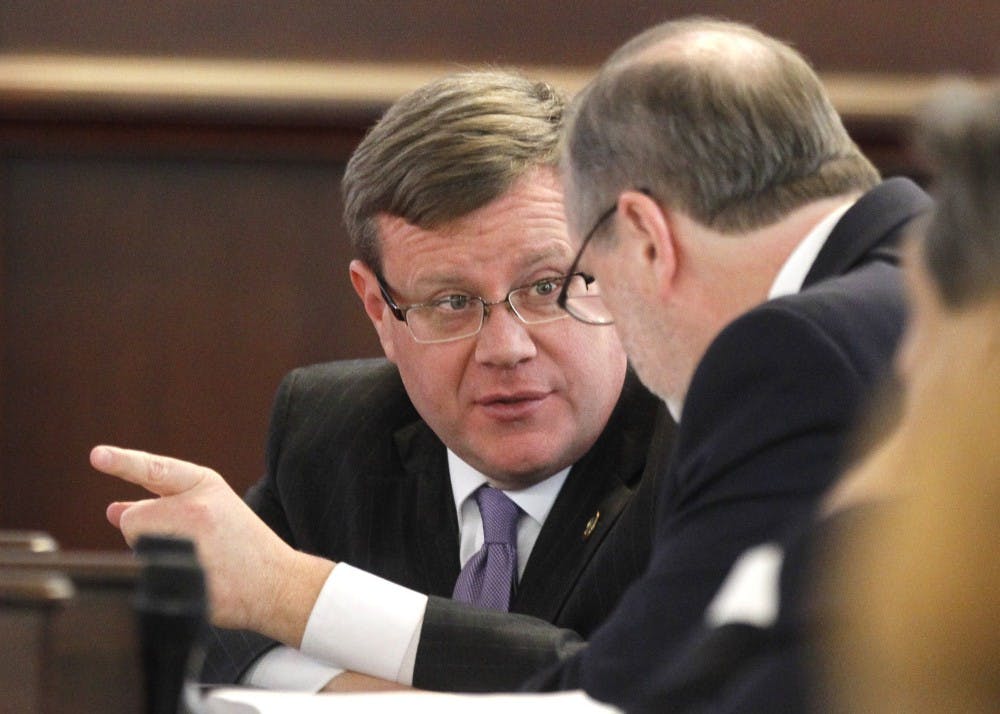Moore began his political career as the speaker of Student Congress when he was an undergraduate at UNC-Chapel Hill in 1991. During his time on campus, he led a controversial attempt to defund the Carolina Gay and Lesbian Association.
Moore was appointed to the UNC Board of Governors in 1997 and served until 2001. He was elected to the N.C. House of Representatives in 2002 from the 111th District, representing Cleveland County.
Moore became Speaker of the N.C. House in 2015. During his tenure, he has stressed fiscal prudence and has presided over controversial moves, such as the transgender bathroom use law known as “HB2,” as well as the recent vote to override the Governor’s budget veto during a 9/11 memorial last month.
Buzz around the GA
Now, Moore's combative style has led multiple Democrats in the General Assembly to oppose the potential of Moore running the UNC System.
While the names of the candidates who have applied for the position are kept confidential, many sources within the General Assembly have expressed their ideas that Moore may be angling for it.
N.C. Rep. Graig Meyer, D-District 50, representing Orange County, said that while he couldn’t validate them himself, “certainly, those rumors abound.”
“I do not believe that Speaker Moore would be a good leader for the university system,” Meyer said. “What we’ve seen demonstrated with the lack of integrity of his leadership in the General Assembly, I don’t think we need that to be leading our crown jewel university system.”
Martin went even further, saying he thinks that no member of the General Assembly would be a fitting candidate for the job.
“Speaker Moore has been partially responsible for the politicization of the Board of Governors,” Martin said. “In the General Assembly, we for better or for worse are partisan creatures. And certainly those exist on both sides of the aisle — both Democrats and Republicans. And Speaker Moore, as a highly partisan figure, would be absolutely the wrong choice to be president of the university system. And I think that’s probably true for the other 165 members of the General Assembly also.”
But N.C. Rep. John Fraley, R-District 95, chair of the University Education committee in the House, laid out multiple desirable qualifications for the new president. Fraley said Moore checks many of his boxes, but said he had not been told that Moore was or wasn’t looking for the job.
To get the day's news and headlines in your inbox each morning, sign up for our email newsletters.
“When you look at the list of things for an ideal candidate, yes he fulfills some of those things, and I think could be a viable candidate, yes,” Fraley said.
While Moore's office did not explicitly deny that the Speaker would be interested in the position, communications director Joseph Kyzer emphasized that he is focused on his reelection to the N.C. House.
"Speaker Moore is seeking reelection to the N.C. House in 2020 and if he’s successfully elected he plans to run for another term as speaker," Kyzer said. "I can tell you he’s been focused on returning a supermajority to the General Assembly and doing that work if behalf of the caucus."
A politicized process
Having system presidents with political backgrounds is far from unheard of.
Erskine Bowles, UNC-System president from 2005 to 2011, was President Bill Clinton’s chief of staff, and former President Margaret Spellings was the Secretary of Education under the Bush administration.
But Martin said this time is different.
“At any time in the university system's existence, but particularly at this crucial time, it is important that whoever the president is has the trust and respect across the political spectrum,” he said.
“And also that trust is that it will not be someone who plays the political games that the General Assembly does. So I think it's rare that a member of the General Assembly is ever the right candidate to be the president of the university system. But that’s more true now than it ever has been in the system's history.”
Part of the politicized nature of the university system comes from the manner in which the Board of Governors is appointed. Board members are elected by the General Assembly to staggered four-year terms.
Since the Republican Party has held a majority in the General Assembly since 2011, there are currently zero self-identified Democrats on the Board. Consequently, some argue that the search committee cannot be described as a non-partisan actor.
While backgrounds in business, education and politics have all been described as advantageous for a successful candidate, Jenna Robinson, president of the conservative -leaning James G. Martin Center for Academic Renewal, said it matters more what their ideas are.
“I think it’s more important that they have the right skills and the right mindset than where they come from,” Robinson said. “I think each sector comes with its own set of blinders and presuppositions, so if you come from politics, you’re used to working in a world where everything is partisan. And it’s hard to get out of that mindset moving into higher education.”
N.C. Rep. Verla Insko, D-District 56, whose district includes Chapel Hill, said a partisan actor will cause problems.
“He is ideologically identified," Insko said. "I think that would raise questions. It would create unnecessary questions and create unnecessary problems. There are many people, I’m sure, who are well qualified to lead those university campuses and to lead the university system as a whole that don’t bring political baggage with them.”
When asked if a political actor would be a good fit for the position, Kyzer said it would be up to the search committee to decide.
“The Speaker's certainly been focused on doing everything the General Assembly possibly can to benefit and support the UNC system from his role here," he said. "And so, those determinations are for the search committee to make."
@MichaelJTaffe
city@dailytarheel.com




